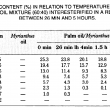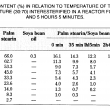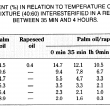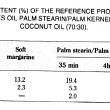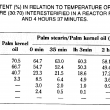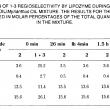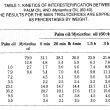Journal of Oil Palm Research Vol. 4 No. 1 1992 June, p. 1-10
MAKING VALUE – ADDED PRODUCTS FROM PALM OIL BY 1-3 REGIOSELECTIVITY ENZYMATIC INTERESTERIFICATION
Work was undertaken with a view to enhancing the commercial and nutritional quality of palm oil and its solid fraction by enzymatic interesterification, catalyzed by 1-3 regioselective lipases in a molten medium. The main aim are to develop base materials for table or confectionery margarine; and to produce liquid oils for salad-dressing and frying, possibly enriched with essential fatty acids, to meet technological and nutritional requirements.
The biological processing of palm oil and its solid fraction by interesterification in a tubular reactor with a fixed catalyst bed containing Lipozyme offers the advantage of continuous enzymatic transformation which makes for greater flexibility in obtaining products with specific properties. A study of reaction kinetics showed that transformation was complete after 5 h in the reactor, which corresponded to a flow rate of 3.5 ml per hour. For a given pair of oils in a defined oil/counter-oil ratio, establishment of kinetics showed that it is possible to manufacture products which all have rheological properties closely linked to the time spent in the reactor. Thus, 1-3 RI of the palm stearin/palm kernel oil (30:70) mixture for 30 min and 3h 30 min led to materials resembling a firm margarine in the first case and a soft margarine in the second case. Interesterification with fluid oils gives either plastic fats or oils virtually fluid at 20°C which could be used as salad oils in hot countries.
FIGURES & TABLES:
* Division Chimie des Corps Gras,
CIRAD-IRHO, BP 5035,
34032 MONTPELLIER
Cedex, France
